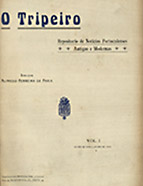

................................
In complete continuity with this characterisation are the 36 issues of its second year (1909–1910), which introduced new sections such as Efemérides [Ephemerides], Notas ao Tripeiro [Notes to O Tripeiro ], and Escavações históricas portuenses [Historical Excavations of Porto]. These issues also welcomed new contributors, some of whom used pseudonyms that had been omitted in earlier publications. Among the notable contributors were Pedro A. Dias, Sampaio Bruno, Rocha Peixoto, and Adolfo Loureiro—figures directly linked to the vibrant cultural and artistic dynamism of Porto at the turn of the 20th century, including the Republican movement itself. O Tripeiro fits seamlessly into this context, with its director sharing the vision of history as a crucial factor in shaping individual and collective identity. This perspective gained even more importance during a time of political instability. The publication embraced a blend of historiographical approaches—liberal, positivist, and historicist—reflecting the diversity of its contributors. While the interaction between these differing methodologies helped to mitigate some of their inherent limitations, it also innovated by enabling the integration of varied perspectives and interpretations of history as a science. The transition to the First Republic occurred during the third series (1910–1913), and the publication prominently featured the defence of the new regime. It participated in debates about national symbols and celebrated the figures and movements that paved the way for the Republic. However, the challenges of maintaining circulation became apparent, necessitating changes in response to the evolving political and social landscape. In 1912, the quarterly edition was replaced by a monthly one, with management duties shared by the founder’s brother, Guilherme Ferreira de Faria. Despite this adjustment, the customary run of 36 issues abruptly ended after a year without explanation.
This work is financed by national funds through FCT - Foundation for Science and Technology, I.P, in the scope of the projects UIDB/04311/2020 and UIDP/04311/2020.
